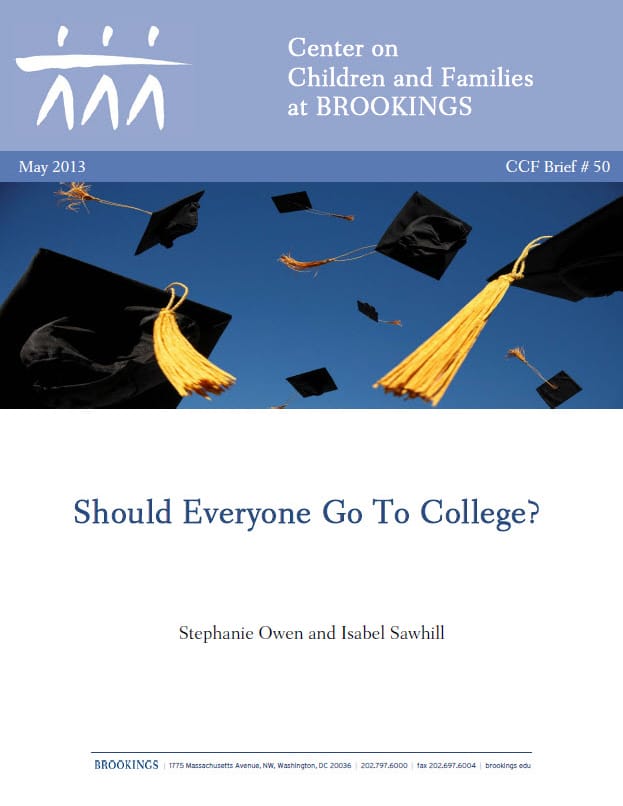 With backpacks full of student debt and too few job opportunities to go around, things are looking bleaker for today’s college graduates. So what to tell the next generation? According to this brief from the Brookings Institution (and some notable others), although college graduates still make more money over their lifetimes than their peers with only a high school diploma, one important fact receives far too little attention: Not all college degrees or graduates are equal. The authors look at variations in monetary returns to education along three dimensions: school selectivity, field of study and career, and graduation rates. The findings? First, selectivity matters; highly selective private schools have high returns on investment (ROIs). But among the less-selective options, public schools are the wiser call (because they are cheaper). Second, the authors highlight the earnings disparities between career tracks, noting that STEM majors far and away outpace others in terms of earnings potential. One telling example: The lifetime earnings of education or arts majors in the service sector are lower than the average earnings of a high school graduate. (Of course, that’s also a sorry commentary on teacher pay.) Third, students who stop along the way and fail to procure a degree incur costs without payoffs. Fewer than 60 percent of those who enter four-year schools end up finishing within six years—but the completion rate swells to 88 percent at the most selective schools. All told, this short study is a treasure trove of information with one overriding message: College is a good investment on average, but choose your major and college carefully—or consider your alternatives.
With backpacks full of student debt and too few job opportunities to go around, things are looking bleaker for today’s college graduates. So what to tell the next generation? According to this brief from the Brookings Institution (and some notable others), although college graduates still make more money over their lifetimes than their peers with only a high school diploma, one important fact receives far too little attention: Not all college degrees or graduates are equal. The authors look at variations in monetary returns to education along three dimensions: school selectivity, field of study and career, and graduation rates. The findings? First, selectivity matters; highly selective private schools have high returns on investment (ROIs). But among the less-selective options, public schools are the wiser call (because they are cheaper). Second, the authors highlight the earnings disparities between career tracks, noting that STEM majors far and away outpace others in terms of earnings potential. One telling example: The lifetime earnings of education or arts majors in the service sector are lower than the average earnings of a high school graduate. (Of course, that’s also a sorry commentary on teacher pay.) Third, students who stop along the way and fail to procure a degree incur costs without payoffs. Fewer than 60 percent of those who enter four-year schools end up finishing within six years—but the completion rate swells to 88 percent at the most selective schools. All told, this short study is a treasure trove of information with one overriding message: College is a good investment on average, but choose your major and college carefully—or consider your alternatives.
SOURCE: Stephanie Owen and Isabel Sawhill, Should Everyone Go To College?, CCF Brief #50 (Washington, D.C.: Brookings Institution, May 2013).
